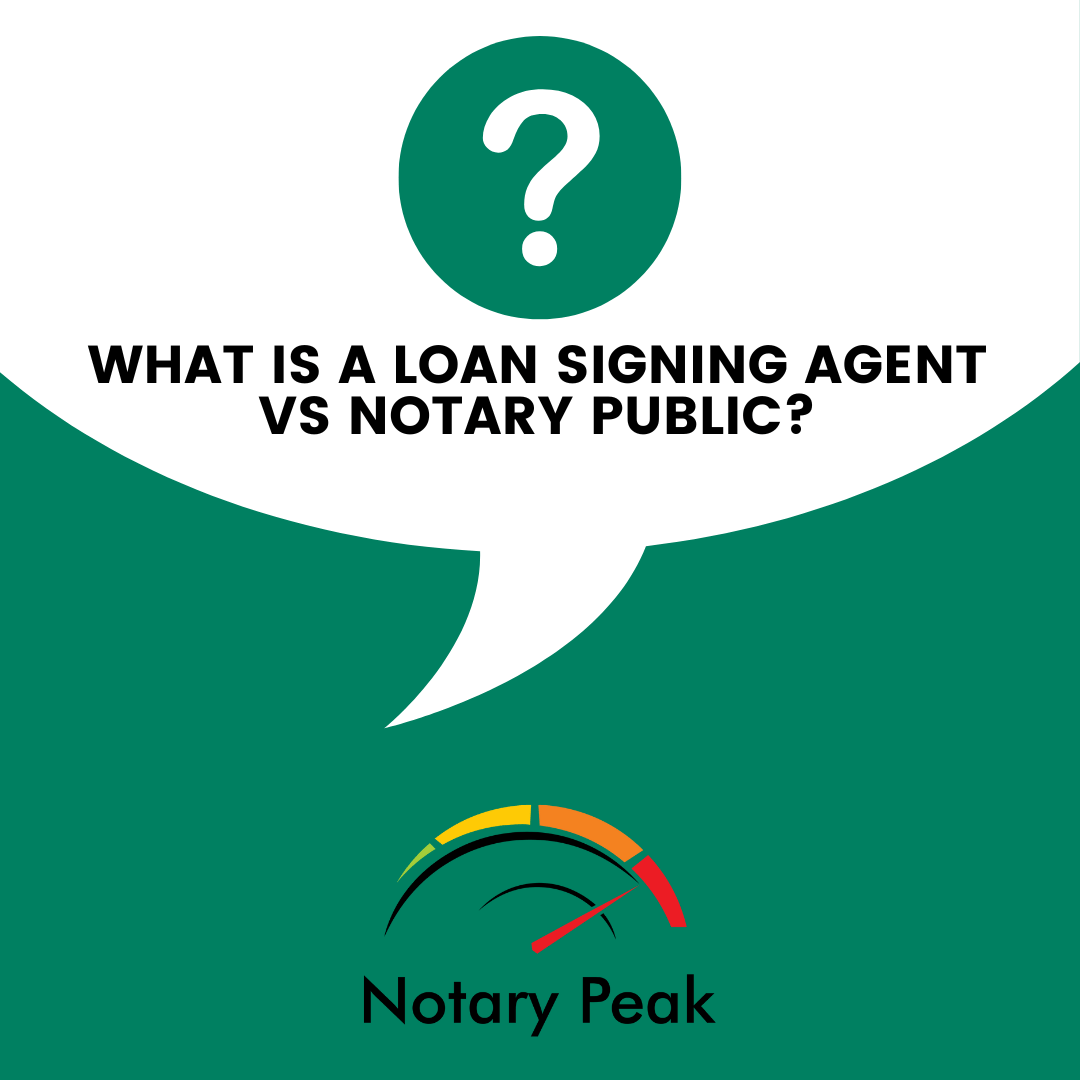In the world of legal and financial documentation, loan signing agents and notary publics play indispensable roles in safeguarding the authenticity and validity of critical documents. While their titles may sound similar, the nuances that set these professionals apart are worth exploring.
Whether you’re seeking their services or considering a career in the field, this exploration of the differences will shed light on the unique contributions of loan signing agents and notary publics, painting a comprehensive picture of their roles in the legal and financial landscape.
(This post may contain affiliate links – read our disclosures)
Qualifications and Licensing
Loan Signing Agent: Becoming a loan signing agent typically involves specific training and certification programs. While both require a background check, aspiring loan signing agents undergo comprehensive training to gain knowledge of loan packages, real estate transactions, and the signing process.
They may enroll in courses offered by reputable organizations or attend workshops to develop their expertise. Once the training is complete, individuals can obtain certifications, such as the Certified Loan Signing Agent (CLSA) designation, to demonstrate their proficiency in the field.
Notary Public: Becoming a notary public involves fulfilling the specific requirements set by the state or jurisdiction in which one intends to practice. Generally, these requirements include completing an application, paying a fee, and passing an examination or training course.
The examination or training ensures that aspiring notary publics understand the laws and regulations related to notarization, including proper identification procedures, document handling, and record-keeping. Upon successfully meeting these requirements, individuals are granted a notary public commission by their secretary of state and the authority to act as notary publics within their jurisdiction.
It’s important to note that while loan signing agents are required to be notaries as well, not all notaries are loan signing agents. The additional training and certification specific to loan signing agents equip them with the necessary knowledge and skills to handle loan signings effectively.
(The following video is by the National Notary Association)
Scope of Responsibilities
Loan Signing Agent: The primary responsibility of a loan signing agent (sometimes referred to as “mobile notaries” in the industry) is to facilitate the signing and notarization of mortgage documents during real estate transactions. They work closely with lenders, the title company, borrowers and sometimes real estate agents to ensure the smooth execution of the loan process.
Loan signing agents are well-versed in the specific documents involved in mortgage and real estate transactions, such as loan agreements, promissory notes, and deed of trust. They guide borrowers through the signing process, ensuring that all required documents are properly completed, signed, and notarized.
Additionally, loan signing agents may also verify the identities of the parties involved, collect necessary fees, and return the signed documents to the appropriate parties.
Notary Public: The scope of responsibilities for a notary public extends beyond loan signings. Notary publics are authorized to perform notarization services on a wide range of legal documents. They can administer oaths, witness signatures, provide copy certifications, and certify the authenticity of documents.
Notary publics play a crucial role in verifying the identity of individuals signing legal papers and confirming their willingness to do so. In addition to loan documents, notary publics may notarize wills, powers of attorney, affidavits, contracts, and other legal instruments.
Their responsibilities include following proper notarization procedures, maintaining accurate records, and ensuring compliance with relevant laws and regulations.
While loan signing agents focus specifically on loan signings and real estate transactions, notary publics may have a broader scope of work and may notarize documents across various legal contexts.
Expertise and Knowledge
Loan Signing Agent: Loan signing agents possess specialized knowledge and expertise in the field of real estate transactions and home loan documents. They are well-versed in the terminology, requirements, and processes involved in mortgage and loan signings.
This includes understanding various loan types, such as conventional, FHA, or VA loans, as well as the specific documents associated with each type. Loan signing agents are familiar with loan paperwork and common industry practices, ensuring that the signing process adheres to legal and regulatory standards.
They are equipped to address borrower questions and provide explanations regarding the documents being signed, promoting clarity and transparency throughout the transaction.
Notary Public: Notary publics require a comprehensive understanding of the laws and regulations related to notarization. They must possess knowledge of proper identification verification, document handling, and record-keeping procedures.
A commissioned notary public is well-versed in the legal requirements for notarizing different types of documents, regardless of the specific content. They are trained to verify the identity of signers, administer oaths or affirmations when necessary, and properly affix their official seal or stamp to attest to the authenticity of the document.
Notary publics stay updated on any changes or updates to notarial laws and regulations to ensure their practices align with current legal standards.
While both loan signing agents and notary publics require expertise in their respective domains, loan signing agents specialize in the intricacies of loan documents and real estate transactions, while notary publics may have a broader understanding of notarial procedures applicable to various legal documents.
Relationship with Clients
Loan Signing Agent: Loan signing agents typically work as independent contractors and establish relationships with various entities involved in the loan process. They may be hired directly by lenders, title companies, escrow officers, or signing services to facilitate loan signings and conduct the closing process on their behalf.
Building strong relationships with these clients is essential for loan signing agents to maintain a steady flow of assignments. They strive to provide reliable and efficient services, ensuring that loan signings are conducted accurately and in a timely manner.
Loan signing agents understand the importance of professionalism and maintaining confidentiality throughout their interactions with clients and borrowers.
Notary Public: Notary publics provide essential services and have a diverse range of clients and may work independently or be employed by different entities, including law firms, banks, government agencies, or businesses requiring notarial services. Their clients can vary from individuals needing personal documents notarized to corporate entities requiring notarization for legal contracts and transactions.
Notary publics must establish trust and credibility with their clients, as they often handle sensitive and confidential information during the notarization process. They prioritize professionalism, integrity, and adherence to ethical standards in their interactions with clients, ensuring the validity and authenticity of notarized documents.
Both loan signing agents and notary publics understand the significance of building strong relationships with their clients. While loan signing agents primarily work with entities involved in real estate transactions, notary publics have a broader client base spanning various industries and sectors.
The ability to establish trust, maintain professionalism, and deliver exceptional service contributes to the success and longevity of their professional relationships.
Compensation and Earnings
Loan Signing Agent: The compensation structure for loan signing agents (mobile notary signing agents) varies based on factors such as location, experience, the type of loan document packages, and the specific agreement with their clients.
Typically, loan signing agents charge a fee per signing or may receive a percentage of the loan amount. The fee can vary depending on the complexity of the transaction and the geographic area. Loan signing agents may also charge additional fees for services such as printing documents, traveling to the signing location, or providing expedited services.
It’s important for loan signing agents to accurately track their assignments and fees to ensure fair compensation for their services.
Notary Public: Notary publics earn income through notarizing important documents. The fees charged for notarial services are usually regulated by the state or jurisdiction in which they operate. These fees can vary from one jurisdiction to another. Notary publics must adhere to the prescribed fee schedule, ensuring they charge within the allowable limits.
Some jurisdictions may also set limits on additional fees that notary publics can charge for services such as travel or document preparation. Notary publics may explore additional income sources by offering related services like mobile notary services, document preparation, or providing guidance on notarial procedures, but they cannot practice law.
It’s important to note that while loan signing agents may earn their income from loan signings, notary publics have a wider scope of potential clients and notarial services.
The compensation for both loan signing agents and notary publics is influenced by factors such as market demand, experience, geographic location, and the specific services provided.
You may want to read our article – “How Much Money can a Mobile Notary Signing Agent Make?“
(Disclaimer: Please note that the information provided in this blog post is for educational and informational purposes only. It is not intended to serve as legal advice or replace the guidance of a qualified professional. State laws and regulations surrounding loan signings, notarizations, and exact requirements for related practices can vary significantly between states and jurisdictions.
It is important to consult with legal and professional resources specific to your location to ensure compliance with the laws and regulations applicable to your situation. Always seek the advice of a licensed attorney or authorized legal professional for any legal matters or concerns you may have.
While we strive to provide accurate and up-to-date information, the rapidly evolving nature of laws and regulations means that some information may become outdated or no longer applicable. Therefore, it is crucial to independently verify and confirm any details or requirements mentioned in this blog post based on the laws and regulations of your state or jurisdiction.
By reading this blog post, you acknowledge that the responsibility for understanding and complying with your state’s notary laws and that following the applicable laws rests with you as an individual or professional. We disclaim any liability for actions taken or decisions made based on the information provided in this blog post.)

What Documents Do You Need Notary Public Services For?
In the world of legal documents, the significance of proper authentication and verification cannot be overstated. This is where the notary public comes in, a

What is a Loan Signing Agent vs Notary Public?
In the world of legal and financial documentation, loan signing agents and notary publics play indispensable roles in safeguarding the authenticity and validity of critical

What is a Mobile Notary and What Do They Do?
In today’s fast-paced world, convenience and efficiency are highly valued. Whether it’s signing important documents, completing legal transactions, or finalizing real estate deals, people often

3 Big Reasons a Real Estate Agent Should be a Notary Public
Can a Real Estate Agent Also Be a Notary Public or Loan Signing Agent for Real Estate Transactions? Yes, a real estate agent can indeed

7 Best Pneumatic Adjustable Height Standing Desks
Elevate Your Workstation: What to Look for in a Pneumatic Adjustable Height Standing Desk In today’s fast-paced and technology-driven world, the way we work and

7 Key Benefits of Being a Mobile Notary Public
Welcome to our insightful blog post where we delve into the world of mobile notary publics and uncover the 7 key benefits that make this

